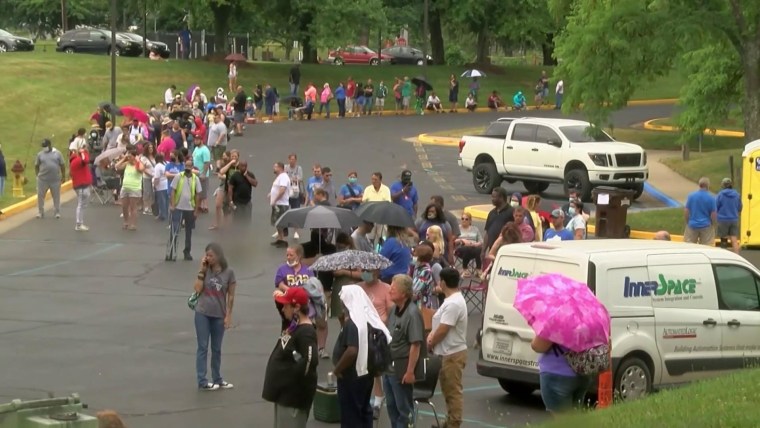George Floyd’s killing in Minneapolis, which ignited protests across the country, did not happen in a vacuum. Floyd belonged to a group that has endured not only physical threats, but also systematic economic deprivation for more than 400 years — ever since enslaved Africans were first brought to the New World.
It was not just the knee of then-police officer Derek Chauvin cruelly pressing down on Floyd’s neck. It was the cumulative pressure of centuries of economic hardship — from slavery, through Jim Crow and right up to the coronavirus pandemic.
Floyd was exposed to fatal harm for a number of reasons, including the discriminatory policies that have long blocked Black Americans from building wealth.
A powerful sense of economic despair and exclusion from the American dream are helping to propel these continuing, huge protests. Police reforms are a critical step. But until the United States confronts the deep, structural reason that African Americans have been left vulnerable to a wide array of assaults — there can be no justice and no peace. That structural problem is the racial wealth gap.
Floyd was exposed to fatal harm for a number of reasons, including the discriminatory policies that have long blocked Black Americans from building wealth and passing it down to the next generation. Researchers are now studying this phenomenon, known as “stratification economics,” an emerging field that looks at how hierarchies and economic inequalities develop among various groups and classes. These researchers examine how security and fairness for Black people depends on access to wealth — an idea that has been taboo in policy circles until recently.
Black Americans have been subjected to serious and pervasive economic headwinds, including a persistent racial wealth gap and a labor landscape in which they suffer joblessness at twice the rate of whites. (The recent positive job numbers for May as the economy struggles to reopen were actually negative for Black Americans.) But the linchpin of this economic disparity is an inability to accumulate assets, according to Darrick Hamilton, executive director of the Kirwan Institute for the Study of Race and Ethnicity at Ohio State University, and other stratification economists.
In order to succeed in a capitalist society, these economists argue, you need capital. Otherwise, you’re in for a rough ride — no matter how smart and hard-working you are. Your character or your potential won’t make the difference.
Hamilton learned this from personal experience. Though he came from a family of modest means in New York’s Bedford-Stuyvesant neighborhood, he was able to attend an elite private school and earn a spot at Oberlin College. That’s where he first noticed something very different about the experiences of Black and white students. While the white kids were getting checks in the mail from mom or granddad for tuition or extracurricular activities, Black students struggled financially even if they worked and saved assiduously.
At every step on the journey of American life, having wealth transferred from family members with assets makes a tremendous difference.
Compared to white students, Black students were more likely to have extended family members who needed money and asked them to help. When Black students got a summer job, for example, they might end up sending checks to help a nephew or a cousin. Economists refer to this as “leakage.”
At every step on the journey of American life, having wealth transferred from family members with assets makes a tremendous difference — whether it’s buying your first car or your first home, starting a business, paying school tuition or building a nest egg. While it’s great to have a good job and a steady paycheck, that’s not what really secures your position in the middle class — wealth is what seals the deal.
It’s the engine that drives upward mobility. A paycheck is a one-time thing and a job can be lost, but wealth is the stuff that grows over time. It offers returns and security that last. As the adage goes, wealth begets wealth.
If you’re Black, however, the magic of compound interest is an elusive prospect. The typical Black household, Hamilton notes, has only 10 cents for every dollar of wealth in a typical white household.
Many Americans grew up watching “The Cosby Show” and its upbeat portrayal of a successful, Black middle-class family. But Hamilton says that such families are a still a rarity. Most Black families do not have enough to sustain them during an emergency and still largely exist at the subsistence level. The United States, he notes, has more parity on education and income than wealth.
Since the 2008 economic collapse, Hamilton’s research with economist Christopher Famighetti shows Black college graduates have faced bigger barriers in the housing market compared to whites. This flies in the face of the truism that a college degree translates into economic security. Their research reveals that Black households headed by a college graduate tend to have less wealth than white households headed by a high-school dropout.
Americans have not wanted to hear this story, partly because it goes against the cherished national narrative that education and hard work are the tickets to success in America. Many people continue to cite bad individual decisions or ill-founded notions of personal or group deficits as the reasons for widespread racial inequality, rather than discrimination that’s baked into America’s economic pie.
But as Duke University economist William Darity explains, “wealth is both a safety net and a trampoline.” It helps you weather the hard times, and it gives you the freedom to take risks. The 2008 economic collapse disproportionately hit the wealth of Black Americans, Darity’s research shows, and by 2013, Black median family wealth had sunk to $13,487, from $24,318 in 2007. Many never recovered.
Now comes the coronavirus. Which, Darity finds, is on track to widen the wealth gap even more.
This should be intolerable in America, which is why Black Lives Matter protesters are increasingly demanding an end to both police brutality and economic injustice. But how to fix a problem like wealth disparity that is centuries in the making? Some argue for reparations in the form of direct payments. Others point to policies that would help level the playing field at birth, like the idea of “baby bonds,” (a centerpiece of Sen. Cory Booker’s recent presidential run) in which the federal government would create a trust account for every newborn to be used at adulthood for asset-building activities.
Tackling such a long-term and insidious problem will likely take more than one solution or intervention. It could include major fixes such as making college and health care more affordable, expanding Social Security and tackling racist economic practices in all their devilish forms — from unfair housing policies to credit score discrimination.
Fundamentally, Americans have to face a hard truth that alters the story of who we are. We have not been a society in which everyone has an equal opportunity for life, liberty and the pursuit of happiness. But we still have a chance to be.
We may not be able to change the beginning of the story — but we can change how it goes from here.













